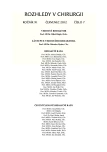Results of limited resection of carcinoma of the gastroesophageal junction
Authors:
R. Vrba; R. Aujeský; Č. Neoral
Authors‘ workplace:
I. chirurgická klinika FN Olomouc, přednosta: doc. MUDr. Č. Neoral, CSc.
Published in:
Rozhl. Chir., 2012, roč. 91, č. 7, s. 368-372.
Category:
Original articles
Overview
Introduction:
The authors present results of surgical therapy in adenocarcinoma of gastroesophageal junction.
Material and methods:
The patient set included 14 patients, 7 men and 7 women. The average age of the patients was 72 years. The study only included patients in initial phases of malignant disease, according to EUS category T1, 2, N0. PET/CT ruled out generalization in all patients. Another criterion for this type of resection was general polymorbidity and older patient age. Resection of gastroesophageal junction and lymphadenectomy were performed in all patients. Splenectomy was performed in six patients. Reconstruction of the upper part of the GIT was performed by esophagogastroanastomosis; pyloromyotomy was standard procedure. In two cases resection of the distal esophagus was performed from a right thoracotomy.
Results:
No serious complications were observed during the operation. In one patient a cholecystectomy was performed for empyema of the gallbladder together with the resection of the GE junction during which injury of common bile duct occurred. A hepaticojejunostomy was performed. Fistula in anastomosis after the operation was described in four patients, conservative therapy was successful in two cases, in one case surgical treatment was nessesary. One woman patient died after fistula complications with development of septic shock and pulmonary failure.
Conclusion:
Resection of the gastroesophageal junction is surgical therapy for patients in initial stages of adenonocarcinoma of the GE junction if the required criteria of RO resection are fullfilled.
Key words:
adenocarcinoma of the gastroesophageal junction – surgical therapy – RO resection
Sources
1. Stein HJ, Feith M, Siewert JR. Cancer of the esophagogastric junction, Surgical Oncology 2000;9.35–41.
2. Devesa SS, Blot WJ, Fraumeni Jr., JF. Changing patterns in the incidence of esophageal and gastric carcinoma in the United States. Cancer 1998;83 : 2049–53.
3. Kalish RJ, Klensey PE, Orringer MD, Appelman HD. Clinical, epidemiologic and morphologic comparison between adenocarcinomas arising in Barretts esophageal mucosa and gastric cardia. Gastroenterology 1984, 86,461–467.
4. Thomson JJ, Zinsser KR, Enterline HC. Barretts metaplasia and adenocarcinoma of the esophagus and gastroesophageal junction, Hum Pathol 1983;14 : 42–61.
5. Lagergren J, Bergstrom R, Lindgren A, Nyren O. Symptomatic gastroesophageal reflux as a risk factor for esophageal adenocarcinoma N Engl J Med 1999;340 : 825–831.
6. Rosenberg JC, Buder H, Edwards RC, Singal S, Steiger Z, Sundareson AS. Analyse of adenocarcinoma in Barretts esophagus utilising a staging system. Cancer 1958;55 : 1353–60.
7. Becker HD, Hohenberger W, Junginger T, Schlag PM. Chirurgická onkologie, Grada, Praha 2005 : 343–358.
8. Rahden BH, Stein HJ, Siewert JR. Surgical management of esophagogastric junction tumors, World J Gastroenterol 2006;12 : 6608–6613.
9. Mariette C, Castel B, Balon JM, Van Seuningen I, Triboulet JP. Extend of esophageal resection for adenocarcinoma of the esophagogastric junction, Eur J Surg Oncol 2003;29 : 588–593.
10. Ondrák M, Šefr R. Role PET a CT vyšetření v managmentu léčby zhoubného onemocnění tlustého střeva a konečníku – review, Rozhledy v chirurgii 2007;9 : 461–465.
11. Feith M, Stein HJ, Siewert JR. Pattern of lymphatic spred of Barretts cancer, World J Surg 2003 27 : 1052–57.
12. Graham AJ, Finley RJ, Clifton JC, Evans KG, Fradet G. Surgical management of adenocarcinoma of the cardia. Am J Surg 1998;175 : 418–421.
13. Papachristou DN, Fortner JG. Adenocarcinoma of the gastric cardia. The choice of gastrectomy. Am Surg 1980;192 : 58–64.
14. Furukawa H, Hiratsuka M, Imaoka S et all. Limited surgery for early gastric cancer in cardia. Annals of Surgical Oncology 1998;5 : 338–41.
15. Harwick RH, Williams GT. Staging of esophageal adenocarcinoma. Br J Surg 2002; 89 : 1076–1077.
16. Gatěk J, Duben J, Bakala J, Miča T, Dudešek B, Haša E, Musil T, Hnátek L. Lymfadenektomie u časného karcinomu žaludku, Rozhledy v chirurgii 2004;9 : 428–438.
17. Vrba R, Neoral Č, Aujeský R. Karcinom žaludku – výskyt a řešení komplikací chirurgické léčby, Rozhledy v chirurgii 2010;3 : 178–183.
18. Oh SJ, Choi WB, Song J, Hyung WJ, Choi SH, Noh SH. Complications requiring reoperation after gastrectomy for gastric cancer: 17 years experiance in a single institute, J Gastrointest Surg 2009;13 : 239–345.
Labels
Surgery Orthopaedics Trauma surgeryArticle was published in
Perspectives in Surgery

2012 Issue 7
- Possibilities of Using Metamizole in the Treatment of Acute Primary Headaches
- Metamizole vs. Tramadol in Postoperative Analgesia
- Metamizole at a Glance and in Practice – Effective Non-Opioid Analgesic for All Ages
-
All articles in this issue
- Results of limited resection of carcinoma of the gastroesophageal junction
- Breast reconstruction by autologous fat transfer
- Patent foramen ovale and the risk of paradoxical embolization of venous bubbles in divers – cave for foam sclerotization of varicose veins
- Surgical treatment of complicated hepatic echinococcosis in two Bulgarian citizens at two surgical departments in the Czech Republic
- Segmental duodenectomy (D3, D4) for angiosarcoma
- Endosonography of the oesophagus in the diagnosis and treatment of oesophageal tumours
- Descending necrotising mediastinitis – surgical management
- Perspectives in Surgery
- Journal archive
- Current issue
- About the journal
Most read in this issue
- Surgical treatment of complicated hepatic echinococcosis in two Bulgarian citizens at two surgical departments in the Czech Republic
- Descending necrotising mediastinitis – surgical management
- Segmental duodenectomy (D3, D4) for angiosarcoma
- Endosonography of the oesophagus in the diagnosis and treatment of oesophageal tumours
